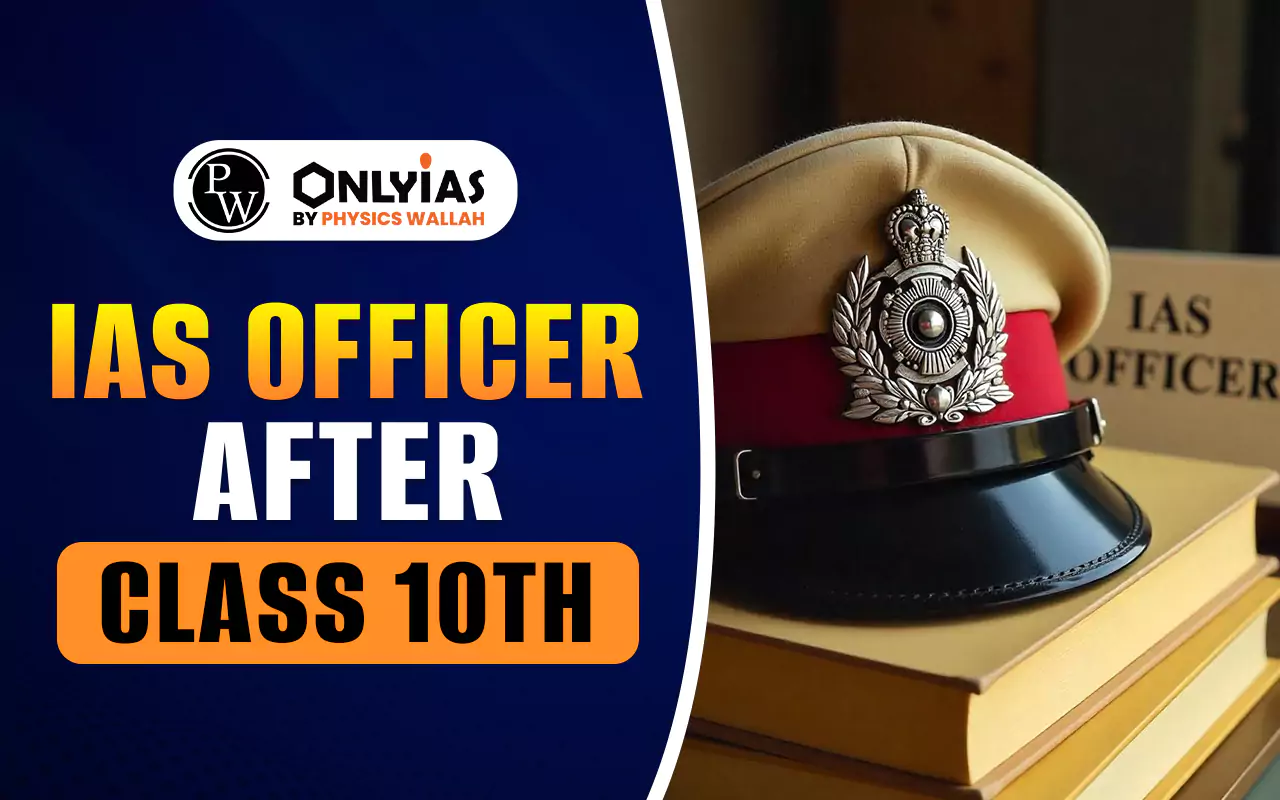Want to become an IAS Officer after Class 10th? Learn the complete step-by-step process to start UPSC preparation early, choose the right stream and subjects, understand exam stages, and build a solid foundation for success in the IAS journey.

IAS Officer After Class 10th: The Indian Administrative Service (IAS) is one of the most prestigious and competitive career options in India. The UPSC Civil Services Examination (CSE), which selects IAS officers, is conducted by the Union Public Service Commission every year. The exam is known for its high standards and comprehensive syllabus. While the eligibility criteria include a minimum of a bachelor’s degree and an age of 21, starting early (right after Class 10) can give you a strong edge.
If you have passed your 10th exam and are looking for a better career opportunity, and you have questions like “How to become an IAS officer after 10th?” or “How to prepare for UPSC after 10th?”, then candidates must read on to get a walkthrough of pursuing the dream of becoming an IAS Officer After Class 10th step-by-step process.
An IAS (Indian Administrative Service) officer is one of the most respected and powerful positions in the Indian civil services. The IAS Officer after Class 10th is a journey that begins early and demands clarity, commitment, and strategy. The UPSC (Union Public Service Commission) conducts the Civil Services Examination (CSE) annually to recruit officers for IAS, IPS, IFS, and other allied services.
However, one must remember that the eligibility criteria to appear for this examination include:
Thus, while you cannot appear for UPSC right after Class 10, you can start preparing effectively and build a strong foundation.
No, one cannot become an IAS officer directly after Class 10th, as the UPSC Civil Services Examination requires a minimum qualification of a bachelor’s degree from a recognized university. Candidates must complete 12th grade and pursue undergraduate studies in any discipline before applying, with final-year students eligible provisionally. The process involves clearing Prelims, Mains, and Interview stages post-graduation, typically starting at age 21. Early preparation after 10th or 12th aids success but does not waive the degree requirement.
The IAS exam requires a graduate degree, and there are certain age limits and attempt restrictions:
| IAS Officer Eligibility Criteria | |
| Criteria | Civil Services (UPSC) |
| Minimum Qualification | Graduation |
| Age Limit | 21–32 years (with category relaxations) |
| Number of Attempts | Limited: Gen–6, OBC–9, SC/ST–unlimited |
| Nationality | Indian citizen (mandatory) |
UPSC Eligibility Criteria 2025
Many students wonder about the IAS Officer After Class 10th step by step process. While you cannot directly appear for the exam now, you can structure your path wisely:
| UPSC Exam Structure | ||
| Exam Pattern | Prelims | Mains |
| Exam Mode | Offline | Offline |
| Exam Duration | 2 papers of 2 hours each | 9 papers of 3 hours each |
| Type of Paper | Objective | Descriptive |
| Type of Questions | MCQs | Descriptive |
| Total Number of Questions | CSAT: 80 questions
GS: 100 questions |
Usually, 20 questions per paper |
| Total Marks | 400 | 1750 |
| Marking Scheme | +2 for correct answer, negative marking of 1/3 of 2 marks | No negative marking |
If you’ve decided to start your journey toward becoming an IAS Officer after Class 10th, here are essential tips for early UPSC preparation:
UPSC Eligibility Criteria 2025
Students often wonder, “Which stream is best for UPSC after 10th?” While UPSC allows graduates from any stream, choosing:
Choosing the right subject after class 10th is one of the most important decisions for aspirants who wish to become an IAS officer. If you’re wondering which subject is best for UPSC after 10th, the answer largely depends on your interests and future strategy for the Civil Services Exam. However, some subjects give you a strategic advantage in the IAS exam.
For aspirants serious about becoming an IAS Officer After Class 10th, subjects like History, Political Science, Geography, Economics, and Sociology (found in the Humanities stream) can help build a strong foundation. These subjects are not only helpful in Prelims and Mains but also commonly chosen as optional subjects in the UPSC exam. So, if you’re considering how to become an IAS officer after 10th, selecting these subjects will streamline your preparation in the long run.
Understanding the advantages and challenges is crucial before beginning your IAS journey at an early stage. If you are aiming to become an IAS Officer after Class 10th, being aware of both sides will help in making informed choices and avoiding burnout or wrong steps in future.
UPSC Previous Year Question Papers (PYQs)
The journey to becoming an IAS Officer After Class 10th may be long, but it is certainly achievable with the right strategy and dedication. While you cannot directly appear for the IAS exam after class 10th, beginning your UPSC preparation early provides you with a significant advantage.
Follow the IAS Officer After Class 10th step by step process, choose subjects wisely, and develop a deep understanding of the UPSC syllabus. With commitment, planning, and the right guidance, you can turn your dream of becoming an IAS officer into reality.
Ready to boost your UPSC 2026 preparation? Join PW’s UPSC online courses today!
Check Out UPSC CSE Books
Visit PW Store
To become an IAS officer after 10th, complete your graduation and prepare for UPSC from an early stage with a strong foundation.
The IAS officer after class 10th step by step process includes choosing the right stream in 11th, completing graduation, and then preparing for UPSC CSE.
Yes, you can choose any stream after 10th. UPSC allows candidates from all academic backgrounds to appear for the IAS exam.
You must be a graduate and 21 years old to appear for UPSC. Starting IAS exam preparation after class 10 helps you stay ahead.
Though all streams are eligible, humanities is often considered best for UPSC as subjects like history and polity are core parts of the syllabus.
It typically takes 6–8 years, including 12th, graduation, and 1–2 years of UPSC preparation, depending on individual performance and dedication.
<div class="new-fform">
</div>
